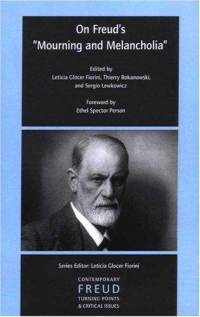sigmund freud mourning and melancholia – melancholia wikipedia
· Sigmund Freud himself published a paper in 1917 just in the wake of World War I musing on the psychological responses to loss In this paper which he called Mourning and Melancholia Freud posits that there are two different kinds of responses to loss called you guessed it! mourning and melancholia, Both responses look similar as far as
Email : greg,rizzolo@depthcounseling,org
Retrouvez On Murder, Mourning and Melancholia et des millions de livres en stock sur Amazon,fr, Achetez neuf ou d’occasion Amazon,fr – On Murder, Mourning and Melancholia – Freud, Sigmund – Livres Choisir vos préférences en matière de cookies
Subject: Image Created Date: 3/28/2007 4:58:10 PM
Manquant :
sigmund freud
Mourning and Melancholia: Freud’s Thoughts on Loss — Depth
Mourning and Melancholia
Mourning and Melancholia German: Trauer und Melancholie is a 1918 work of Sigmund Freud, the founder of psychoanalysis,, In this essay, Freud argues that mourning and melancholia are similar but different responses to loss,In mourning, a person deals with the grief of losing of a specific love object, and this process takes place in the conscious mind,
Freud Mourning And Melancholia
· Fichier PDF
sigmund freud mourning and melancholia
No mourning is possible here the work of parting is blocked in melancholia writes Freud since there is a basis of ambivalence that wishes to hold the object and to let go of it at the same time,6 Freud advocates killing off the traces of attachment to the other, as a means to reestablishing mental health and returning to life, This demonstrates that Freud professes that a subject can in
Amazon,fr
Cultural Reader: Freud
Mourning and Melancholia, by Sigmund Freud,
· Freud’s mourning theory has been criticized for assuming a model of subjectivity based on a strongly bounded form of individuation This model informs “Mourning and Melancholia” 1917 in which Freud argued that mourning comes to a decisive end when the subject severs its emotional attachment to the lost one and reinvests the free libido in a new object
Melancholy Philosophy: Freud and Benjamin
· In Sigmund Freud’s “Mourning and Melancholia” 1917 he offers the notion that melancholy and mourning are two different responses to loss, For Freud, pathological melancholy, unlike normal mourning, is a process in which separation from an object of attachment remained incomplete for some reason, Instead of retracting the libido invested with the lost object and redirecting it to another
Mourning Beyond Melancholia: Freud’s Psychoanalysis of
Sigmund Freud’s “Mourning and Melancholia” “Trauer und Melancholie” was published one-hundred years ago, but this seminal essay continues to guide clinical psychiatrists in the
Freud, S, 1917, Mourning and Melancholia, The Standard Edition of the Complete Psychological Works of Sigmund Freud, Volume XIV 1914-1916: On the History of the Psycho-Analytic Movement, Papers on Metapsychology and Other Works, 237-258 , Strachey, J, 1917, Mourning and Melancholia,
Melancholia
· In his essay Mourning and Melancholia 1917 Freud describes the differences and similarities between mourning the death of a loved one and depression melancholia as it can occur in some individuals Freud observes that when one mourns the loss of a loved one sadness is the main feature, When one is depressed, guilt and self-reproach are the main features, This distinction leads Freud to
Mourning beyond melancholia: Freud’s psychoanalysis of loss
SIGMUND FREUD Translatedfrom the German under the General Editorship of JAMES STRACHEY In Collaboration with ANNA FREUD Assisted by ALIX STRACHEY and ALAN TYSON VOLUME XIV 1914-1916 On the History of the Psycho-Analytic Movement Papers on Metapsychology and , Other Works , LONDON , THE HOGARTH PRESS , AND THE INSTITUTE OF PSYCHO-ANALYSIS , 400, act , MOURNING AND MELANCHOLIA …
A Theory of Depression: S Freud’s Mourning and Melancholia
Sigmund Freud, Mourning and Melancholia 1917 The Psychoanalysis Unit, The Psychoanalysis Unit’s mission is to break the mould of traditional approaches to psychoanalysis, taking inspiration from the discipline’s ideas to meet modern challenges, Our truly interdisciplinary research draws on a wide range of research methods and theoretical perspectives taken from neuroscience and clinical

University of Pennsylvania
· Fichier PDF
Freud’s mourning theory has been criticized for assuming a model of subjectivity based on a strongly bounded form of individuation This model informs “Mourning and Melancholia” 1917 in which Freud argued that mourning comes to a decisive end when the subject severs its emotional attachment to the lost one and reinvests the free libido in a new object